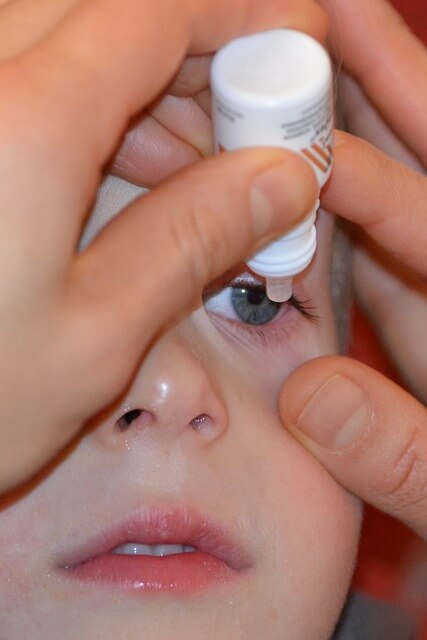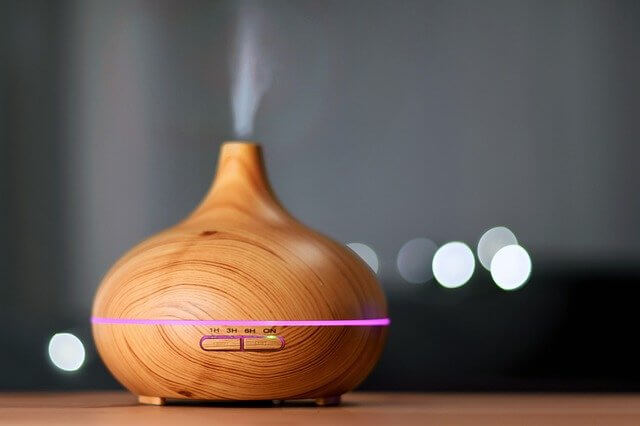Dry eyes can come from allergies, contact lenses, dry air, dehydration, or an underlying medical condition, among many other potential causes. 12 3 Whether it’s an acute (temporary) or chronic (long-term) problem, home remedies offer relief. Some are waiting in your closet or pantry, while others are basic over-the-counter (OTC) remedies that can make a big difference in your eye comfort.
1. Warm Compress
A warm compress is probably the simplest solution on our list. Soak a washcloth in warm water until it’s fully saturated. Squeeze out the excess water, and lay the washcloth over your eyes. Now, relax. The heat and moisture from the compress help open any clogged tear ducts and loosen any discharge that’s gathered in the eyes.
When the compress starts to cool, rinse it out, and place it back in warm water. You can then start the process over again. Warm compresses are especially helpful for dry eyes due to allergies.
2. Artificial Tears
Image courtesy of Pixabay
Artificial tears, otherwise known as saline drops, are found OTC at almost any pharmacy. They’re used for contact lenses, allergies, and in this case, dry eyes. A drop in each eye can keep the eyes lubricated when it feels like sand has snuck under your lids. Be careful in how often you use saline drops. They’re useful to help moisten the eyes, but if used too often, they can wash away natural tears. There’s nothing better than natural tears to moisten dry eyes.
These drops come in tiny containers that fit in a pocket, purse, or backpack. They’re a good solution when traveling on a business trip, to the beach, or on a weekend getaway, which can’t be said for every home remedy.
3. Wash with Gentle, Mild Soaps
Gently washing the eyes with a mild soap can help break up the dirt and oil in clogged tear ducts. It can also wash away any other debris that’s developed, or that may be irritating the eyes. For example, pollen and other allergens get in the eyes and trigger that dry, sandy feeling. A gentle soap can help get those particles out, relieving irritation.
However, a gentle wash isn’t something you want to do several times a day. Too much of a good thing can irritate the eyes and make dry eyes worse. It’s also more effective for allergies and clogged pores rather than a medical condition like dry eye syndrome unless specifically recommended by a doctor. 4
4. Eyelid Massage
Eyelid massage actually works along with other home remedies like a warm compress and washing with a mild soap. A 2017 study even found that using eyelid massage along with a humidifying device can work better to relieve dry eyes than OTC saline solutions. 5
The skin of the eyelids is incredibly delicate. It takes a light hand to massage them. Start at the eye’s center and gently make small circles, moving toward the outer eye and back again. Massage stimulates blood and tears to the area.
5. Castor Oil Eye Drops
Castor oil contains antimicrobial, anti-inflammatory, and analgesic (pain-relieving) properties.6 An OTC eye drop solution with castor oil can add all of that to the eyes. Castor oil has been shown to improve the tear film on the eye and the overall stability of eye hydration levels.
6. Humidifier
Image courtesy of Pixabay
Do not underestimate the power of dry air. Dry air can zap the humidity from your body, including the eyes. Humidifiers come in many shapes and sizes, from desktop humidifiers that improve the moisture levels in a cubicle to whole-house humidifiers that regulate your home environment.7 A cold-mist humidifier or whole-house humidifier can help regulate the moisture levels and stabilize the eye’s tear film.
However, humidifiers are best used in dry to mild climates. Too much humidity in the air can contribute to allergies and other issues not having to do with the eye.
7. Stay Hydrated
Adequate hydration is vital to many of the body’s functions. Severe dehydration can result in the inability to cry. However, there would be many other symptoms along with this level of dehydration. However, mild dehydration could affect your eyes if they’re sensitive. Most adults need around 64 ounces of water per day, depending on size and activity level.
Be particularly vigilant when it’s hot and dry outside. Sip on a water bottle when you’re outside, exercising, or when you’re just sitting at home. Adequate water can help eliminate dehydration as a contributor to your dry eye symptoms. Plus, it’s a habit that can contribute to better overall health, too.
A Final Note
For some people, dry eye is something that they struggle with once or twice, and it never comes back again. For others, it’s a seasonal or chronic issue they have to manage. Any number of issues can contribute to dry eyes. If home remedies aren’t helping, talk to your doctor. An underlying medical condition may require prescription treatments along with the use of regular home remedies. With consistency, you can be back to happy blinking and no more sandy eyes.
Article Sources
Healing Daily uses only high-quality sources, including peer-reviewed studies, to support the facts within our articles. Read our editorial process to learn more about how we fact-check and keep our content accurate, reliable, and trustworthy.
- Majmudar PA. Ocular allergies and dry eye. Ophthalmology Management. Published April 10, 2019. Accessed May 26, 2021.
- Markoulii M and Kolanu S. Contact lens wear and dry eyes: challenges and solutions. Clinical Optomology (Auckland). 2017; 9: 41-48. doi: 10.2147/OPTO.S111130.
- Rouen PA and White M. Dry eye disease prevalence, assessment, and management. Home Healthcare Now. 2018; 36(2): pp. 74-83. doi: 10.1097/NHH.0000000000000652.
- Golder MI, Meyer JJ, and Patel BC. Dry eye syndrome. StatPearls. Updated February 25, 2021. Accessed May 26, 2021.
- Zhao B and Zhang X. Therapeutic effect of a new warm moist air device assisted with eyelid massage on office dry eye. International Eye Science. 2017; 17(8): pp. 1489-1493. doi: 10.3980/j.jssn.1672-5123.2017.8.22
- Sandford EC, Muntz A, and Craig JP. Therapeutic potential of castor oil in managing blepharitis, meibomian gland dysfunction and dry eye. Clinical and Experimental Optometry. 2021; 104(3): pp. 315-322. doi: 10.1111/cxo.13148.
- Wang MTM, Chan E, Ea L, Clifford K, et al. Randomized trial of desktop humidifier for dry eye relief in computer users. Optometry and Vision Science. 2017; 94(11): pp. 1052-1057. doi: 10.1097/OPX.0000000000001136.





